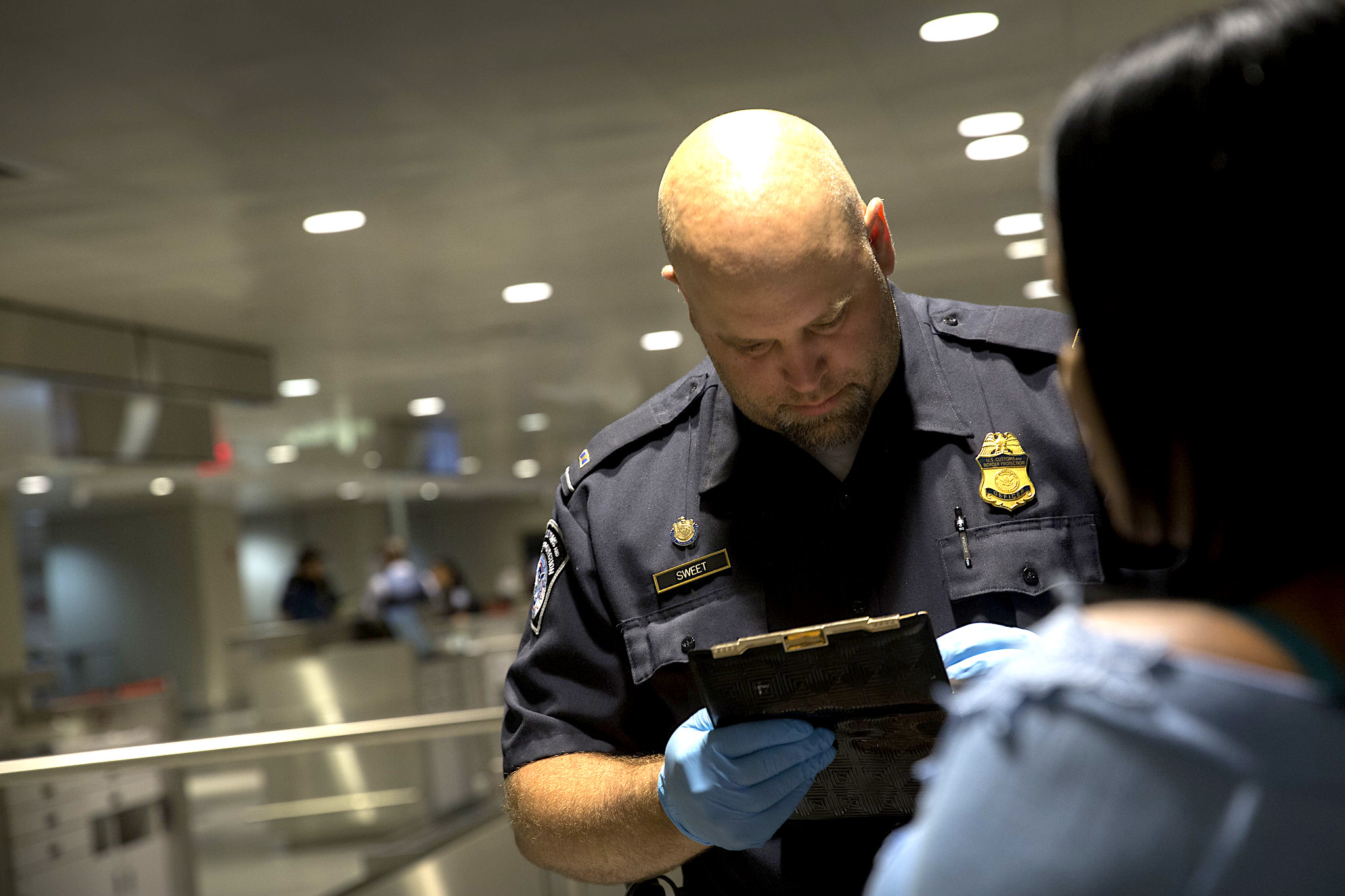We cannot trust that federal agents will just be looking for child pornographers or international drug traffickers when they demand access to our electronics at the border.

CBP officer processing an international passenger arriving at Boston Logan International Airport, June 2017. (U.S. Customs and Border Protection, Flickr, Glenn Fawcett, U.S. Govt)
By John Kiriakou
Special to Consortium News
 After years of conflicting decisions by federal district courts across the country on whether Customs and Border Protection (CBP) agents can search your cell phone and laptop at ports of entry, the Seventh Circuit Court of Appeals has ruled that, “the routine inspection and search of a traveler’s electronics, or for that matter, any other type of property, at the border may be conducted without a warrant, probable cause, or even individualized suspicion of wrongdoing.”
After years of conflicting decisions by federal district courts across the country on whether Customs and Border Protection (CBP) agents can search your cell phone and laptop at ports of entry, the Seventh Circuit Court of Appeals has ruled that, “the routine inspection and search of a traveler’s electronics, or for that matter, any other type of property, at the border may be conducted without a warrant, probable cause, or even individualized suspicion of wrongdoing.”
In reaching the decision, the court agreed with several other circuit courts, but put itself at odds with others and many (lower) federal district courts around the country.
The issue moved quickly to the Supreme Court, which upheld the Seventh Circuit’s decision this month. This is, sadly, despite the fact that the Fourth Circuit ruled earlier this year that “CBP agents need at least reasonable suspicion of a crime to search cell phones” and the Ninth Circuit agreed with that ruling.
The present case stems from the 2016 arrest of Marcos Mendez at Chicago’s O’Hare International Airport. Mendez is most certainly not the poster boy for protection of Americans’ civil liberties, but this is the hand that civil libertarians have been dealt in the case.
Mendez arrived at O’Hare following a trip to Ecuador. Along with his luggage, he carried a personal cellphone, a work cellphone and a work iPad.
Because Mendez had been convicted in 2010 on a charge of indecent solicitation of a child, and because he had a history of international travel to countries where there are weak protections for children, CBP agents pulled him aside and searched his belongings.
Agents used a technology called DOMEX to extract the contents of his phone, where they found thousands of images of child pornography.
Mendez was promptly arrested and charged with multiple counts of possession of child pornography. His attorneys moved to suppress the photos, arguing that they were illegally obtained in violation of the Fourth Amendment.
The federal district court for the Northern District of Illinois denied the motion and, in the end, Mendez pleaded guilty to one count of producing child pornography and was sentenced to six years in prison, but he preserved his right to appeal. The Seventh Circuit now has denied that appeal and the Supreme Court has upheld the conviction.
At first glance, the Circuit Court’s reasoning seems to make some sense. The Court wrote that,
“Congress, since the beginning of our government, has granted the Executive plenary authority to conduct routine searches and seizures at the border, without probable cause or a warrant, in order to prevent the introduction of contraband into this country. This rule is based on the longstanding right of the sovereign to protect itself by stopping and examining persons and property crossing into this country.”

In May 2005, Vice President Dick Cheney, center, observes a U.S. Customs and Border Protection demonstration of some of the technology being used to train law enforcement personnel at the Federal Law Enforcement Training Center in Glynco, Georgia. (White House, David Bohrer, Wikimedia Commons, Public domain)
In almost any normal circumstance, I would applaud the arrest, conviction, and imprisonment of a child pornographer. The country — and our children — are safer with Marcos Mendez in prison. I can’t imagine that anybody will miss him for the next six years.
Abuse of Surveillance Power
But that’s not really the point here. The point is that there is no way that we can trust that our government, in the form of CBP agents, F.B.I. agents, or any other federal “agent,” will solely be on the lookout for child pornographers or international drug traffickers when they demand access to our electronics at the border.
I travel internationally at least three times a year. And at least 50 percent of the time I’m pulled into secondary when I return and try to get through U.S. immigration.
I can only speculate that it is because I have a conviction from more than a decade ago as a result of blowing the whistle on the C.I.A.’s torture program.
Please Support CN’s
Winter Fund Drive!![]()
I always, always refuse to answer CBP’s questions without an attorney present, and my mantra is “you cannot articulate any crime that I might be suspected of having committed and you can’t stop me from reentering my own country.”
They always eventually relent. The process has taken as little as 45 minutes and as long as six hours. It’s a serious pain in the ass. But the principle is worth the inconvenience.
With that said, never have I been asked to turn over my electronics. That could change now with this new court decision.
What happens now if the government doesn’t like your political opinions? Will they take your cellphone or laptop and go through it? Will they take your texts out of context and then work to build a case against you?
What if you’ve exchanged privileged communications with your attorney or your doctor or your psychiatrist? How would that information be protected? What if you have called an abortion clinic for a consultation?
What about your communications on apps like Signal or Telegram or Viber that were supposed to be private? Is nothing sacrosanct?
I recently became aware of a new cellphone available for sale with a “kill switch.” You literally hit the switch as you are turning the phone over to the CBP and it deletes everything on it. I think that’s where we’re all headed next.
After all, if the courts won’t protect us, we have to protect ourselves.
John Kiriakou is a former C.I.A. counterterrorism officer and a former senior investigator with the Senate Foreign Relations Committee. John became the sixth whistleblower indicted by the Obama administration under the Espionage Act — a law designed to punish spies. He served 23 months in prison as a result of his attempts to oppose the Bush administration’s torture program.
The views expressed are solely those of the author and may or may not reflect those of Consortium News.
Please Support CN’s
Winter Fund Drive!![]()
Make a tax-deductible donation securely by credit card or check by clicking the red button:


The UP Phone is owned by Erik Prince of Blackwater etc. Only an idiot would trust Prince.
Carrying an electronic device across borders is now unwise. Send your data ahead of you and throw you device into the sea.
I don’t take a phone or a laptop. I upload everything on my phone and laptop to a storage account someplace and buy a throw-away phone and the cheapest laptop in the country where I have to be. On those I download my data, and send text messages with my temp number to the people who need to contact me. On my way back I do the same, reset the phone to factory, run a good memory/drive cleaner and then give he things to a kid on the street.
You can also take an empty laptop from home with you on the trip, where only the operating system is on plus a browser, if you don’t want to buy a throw-away one.
“You have a kill switch on your phone. That is suspicious and also illegal so you are now under arrest”.
Otto’s comment says it all.
This is the problem with treating the symptom rather than the disease. Which in this case is the government’s gross overreach using the powers only the government seems to see as valid.
I’m pretty sure that if some nefarious entity decided to hack your phone and load it with materials which break the law it can be done. Likely the government has the best chance at doing so successfully!
The patriot and homeland security acts are nefarious in their vary nature because the laws have unlimited overreach. The laws need to be changed and not phone electronics.
I would posit that if the authorities actually desired to do so bad actors of the child pron industry could be traced rather easily if the authorities desired to do so. I need proof if I’m considered to be in error with this assessment.
I have one question for everyone here. Remember the Jeffery Epstein case ?
Thanks CN
It is natural that the erosion of civil liberties begins with an offense like pornography — a moral vice. Only a terrible person with sexual deviance would have illegal images on his phone! And only a terrible person would defend his right to reject the inspection of his phone!
It’s a short step from there to, “If you don’t have anything illegal on your phone, you won’t mind if we inspect it.”
And just one more short step to, “We have inspected your phone and discovered shocking images of child pornography. You’re going to jail for a long time.” Because, once the authorities have access to your electronics, it’s as easy to plant illegal material as it is to discover illegal material.
I’m not defending Marcos Mendez. I’m just pointing out that any one of us could find himself/herself accused of a similar crime if/when it were politically convenient. Someone like Mr. Kiriakou should be especially careful, as he is already a political target. But it could happen to anyone.
Long time missing and wanted: honesty, integrity, truthfulness, morality and compassion.
What if the govt doesn’t like your opinions? Well, all who’ve paid the price to tell the truth would know about that. Very unlikely to become any more benevolent in the future if the past is any guide. Even the supposedly more liberal D administrations haven’t been exactly favorable considering a right to privacy.
Access to your doctor, psychologist, attorney, pastor, co-workers, librarian, and grocer? Great!!! Let’s find out about your dissenter contacts, the suspicious books you read, and that weird foreign food you eat. You anti-American you.
All that blather about murky, hypothetical ‘rights’ when our security is at stake. By “our” of course we mean keeping the powerful and important protected. You lessers need only defer and obey. After all, if you’re not guilty of wrongdoing, how could you possibly object to constant monitoring?
A few years TSA demanded I give them my cell phone during a routine security check for a domestic flight. I was so shocked and confused I complied and didn’t dare question the “authorities”. They appeared to scan it on some sort of device in front of me. I’ve always suspected this was a completely false set- up designed to expose potential troublemakers. I was in my late 50s at the time, a blonde “white” woman, and mid level manager in corporate America.
I was pulled out of the boarding line for a physical search twice for flights on a business trip. I was traveling with two older white males who were not singled out. I
assume I was chosen so TSA could deny any racial or ethnic profiling. But annoying and intimidating none the less.
Wouldn’t it be possible, if you are visiting another country, to buy a new cell phone, use a browser you haven’t used before, set up an new email account with a different service, which you give to close family and friends. (Of course, you would have to not be using the built-in, default browser, at home, or you will still have it on your new phone, so you’d have to use a different login name.) Leave the old phone at home, and go with only that new phone.
If you chose, you could then download the usual browser, after having passed through immigration, and reload your regular content.
On your return, couldn’t you take steps, such as clearing the browser history, and deleting that browser entirely from your new phone before getting to the immigration procedures? Depending on the cost of the new phone, you could even sell it, gift it, or throw it away, in the other country. Your old phone should be where you left it, with everything still on it, in a place where a warrant would be required to seize it.
Just asking.
Everything except the camel’s @$$ is already in the tent, so expect the worst. Of particular concern is Con-leaning LE has been known to plant evidence if they can’t get a ‘bad guy’ any other way.
Al Capone seconds this motion!
Way too funny if it wasn’t so sad.
“Off subject a trend I have been noticing is that any browser doesn’t auto refresh CN pages, when I come to visit ”
Hmmm…?
nefarious I presume /?
Nor does mine
Same.
Thank you, Mr. Kiriakou, you are a hero to thousands of people you’ve never met.
I’m traveling to China this coming year. Hope I survive reentry.
And cellphone makers refuse to engineer/manufacture internal storage that can be removed, and swapped for a “clean” clone with just the operating system and applications.
Apple does the same with ALL of it’s current Macs, not just the laptops.
Not being able to work on smartphones and Macs is also part of the drive to compel consumers to buy unnecessary “upgrades”.
These “upgrades” also mean that one is more and more likely to encounter software that requires an internet connection for use.
Not one of these choices by Apple and Android hardware makers is necessary for computer/software use.
(Windows machines, laptops included, are slightly better for removable C drives, but they also suffer from too much software that requires an internet connection just to run.)